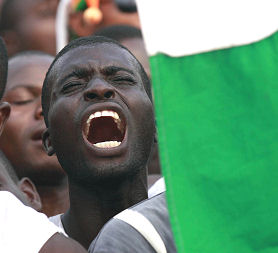Ivory Coast: grounds for optimism, says Kenya’s PM
Kenyan premier Raila Odinga tells Channel 4 News a peaceful conclusion to Ivory Coast’s political crisis is still possible, despite the breakdown of talks on Monday.

The outgoing President of Ivory Coast, Laurent Gbagbo, is refusing to cede power to his rival, Alassane Ouattara, despite an election in the West African state in November which appeared to give victory to Mr Ouattara by a margin of eight percentage points.
Talks between African leaders and Mr Gbagbo to end the impasse concluded without success on Monday. Mr Ouattara’s spokesman, Patrick Achi, said after the meeting: “No, I don’t think there was any progress. We are at the same point as we were last time, which is that he (Gbagbo) keeps refusing to leave.”
That view was endorsed by the Nigerian President, Goodluck Jonathan, chairman of Ecowas (the Economic Community of West Africa States), who told reporters there was still stalemate in the discussions.
However, it emerged today there was reason to hope for a peaceful conclusion to the situation. Kenya’s Prime Minister, Raila Odinga, who as the African Union representative has been involved in the mediation effort, told Channel 4 News International Editor Lindsey Hilsum his talks with Laurent Gbagbo and Alassane Ouattara had offered grounds for optimism.
“We are at the same point as last time, which is that Gbagbo keeps refusing to leave.” Spokesman for Alissane Outtara
“Mr Gbagbo agreed to negotiate unconditionally, including his exit,” Mr Odinga said. “And he agreed to lift the siege on Ouattara. Troops will be removed by midday today.”
The Kenyan premier said that Mr Ouattara says he would only negotiate if Mr Gbagbo accepted him as president, which could prove a sticking point.
And Mr Odinga stressed there was no parallel between the situation in Ivory Coast and Kenya, where he agreed a power-sharing deal with President Mwai Kibaki after disputed presidential elections in 2007.
'The parties should get to the negotiating table quickly'
Prime Minister Odinga had just emerged from a meeting in the Nigerian capital Abuja with President Goodluck Jonathan, when I managed to get him on the phone, writes Channel 4 News International Editor Lindsey Hilsum.
Despite widespread pessimism about the situation in Ivory Coast, he said his talks with Laurent Gbagbo and Alassane Ouattara gave grounds for hope.
"Mr Gbagbo agreed to negotiate unconditionally, including his exit," he said. "And he agreed to lift the siege on Ouattara. Troops will be removed by midday today." He said Mr Ouattara agreed to negotiate if Mr Gbagbo accepted him has President - that sounded to me like a sticking point.
Mr Odinga said the parties should get to the negotating table quickly, and that Mr Gbagbo needed guarantees that he could stay in the country and not be prosecuted.
Asked if he was promoting a Kenyan-style power sharing deal, he said: "There is no parallel with Kenya. We are not pushing for power sharing, but in order to unite the country Ouattara should include Gbagbo in government."
Prime Minister Odinga is now heading to Addis Ababa to report back to the African Union, but says he'll be back as soon as necessary to mediate any talks. The next few days will show if his optimism is misplaced.
Ecowas, which sent three member heads of state to negotiate in Abuja, the Ivory Coast capital, has told Laurent Gbagbo it could use force to oust him if he refuses to leave office quietly.
But intervention is fraught with danger. The prosperity and stability enjoyed by the Ivory Coast in the years following independence in 1960 ensured an influx of foreign workers from neighbouring countries. That community could be in danger from the indigenous population in the event of any military incursion from outside.
The situation in Ivory Coast is very combustible and has implications for all of West Africa. Lindsey Hilsum
“The situation in Ivory Coast is very combustible and has implications for all of West Africa,” writes Lindsey Hilsum. “During the early years of independence, when Ivory Coast was the most stable and prosperous country in the region, many workers from neighbouring countries came and settled.
“The war in 2002 pitted ‘original’ Ivorians, mostly in the south, against the ‘incomers’, mostly in the north. Laurent Gbagbo largely represents the southerners, and Alassane Ouattara the northerners.
“The problem for any West African intervention force is that it makes their nationals and descendants vulnerable – and Mr Gbagbo’s militias won’t hesitate to attack.”
-
Latest news
-
Post Office scandal: workers react to ex-CEO Vennells at inquiry4m

-
Election 2024: what voters think of Rishi Sunak announcement3m

-
Post Office inquiry: former boss Vennells admits evidence was false5m

-
‘We are going after every vote we possibly can’, says deputy leader of Liberal Democrats4m

-
What’s the mood in Wales for an early general election?7m

-




